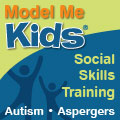My mom is visiting for a few days, and yesterday she invited a couple of her friends over for the day. One of her friends brought along her six-year-old granddaughter. She was a lovely little girl and got along well with MM; Gus entertained himself for the most part with his video games. After lunch we all went to the beach. As we were packing up to leave the beach, Gus got a little restless and started running back and forth. We had to redirect him several times.
Now, this is a perfectly normal routine for us. We just get everything packed up as quickly as possible and just try to keep him out of trouble or from getting all wet again - no big deal. MM and her new little friend were sitting quietly waiting for us to leave when the little girl asked, "What's wrong with him?" Insert big sigh here.
I know she's only six, and she certainly meant no harm. And six-year-olds aren't typically discreet, so of course Gus was standing two feet away just as she asked the question. I tried to explain in as simple terms as I could that Gus doesn't always understand what we're telling him to do or he doesn't always know when we're speaking to him if he's not paying attention or he can't always help not following directions although he tries to listen. Then she asked, "What's that called? Is it called something?" And I answered her honestly that he has autism. She let it drop and we all went on our merry way.
But it made me sad - not so much that a six-year-old asked such blunt questions, but more that I tend to project forward. Will kids still ask those blunt questions when Gus is ten or fourteen, except in a less benign manner? Will those questions be directed toward him and will he be hurt by them instead of oblivious to them as he is now?
The hardest part of his condition for me has always been the worry of how his peers will treat him when he gets older. I know what it's like to be teased, to be threatened, to be a social reject. That wasn't always the case for me, but I definitely had some very traumatic experiences at different periods of my life.
I know I can't shield him from the world and that even if he was 'typically developed,' there are no guarantees that he wouldn't have those types of experiences. Yet as his mother, it's natural to want to shield him, isn't it?
Thursday, August 16, 2007
Subscribe to:
Post Comments (Atom)







Absolutely totally normal for a mother to want to shield her child from pain, even though you can't, really.
ReplyDeleteThere are all sorts of terms for mothers who either like or don't care about seeing their children hurt, but we will not use them on a family oriented blog...
thea
I think the little girl's questions were great. I wish more kids would ask these questions, because it's our answers that help them become more respectful as they grow. Actually, I wish more adults would ask the questions.
ReplyDeleteWhat I really hate are the people who stop asking questions when you tell them that there is something wrong with him. It sometimes feels like they don't want to ask anymore because they might catch it, even though it can't be caught.
I have the same fears as you when I get the "what's wrong with him?" question. It depends on my mood, and my son's, if I want to answer in great detail or not. But, I usually try to answer the question because I figure the more the other parents know, the more they tell their kids.